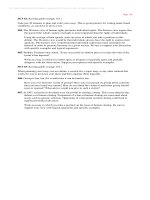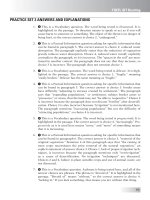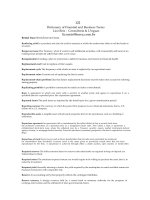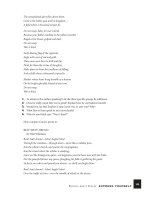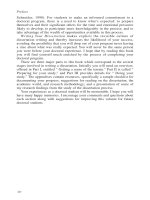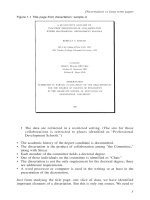Writing your doctoral dissertation - part 13 potx
Bạn đang xem bản rút gọn của tài liệu. Xem và tải ngay bản đầy đủ của tài liệu tại đây (124.02 KB, 5 trang )
Roles and responsibilities of committees
57
faculty to consider the best use of their collective and individual time. When
your dissertation proposal is accepted, your committee is officially
designated. The proposed faculty committee both supports your proposal for
approval and advances the approval of their membership on your dissertation
committee.
University Concerns
The university is concerned that the faculty who are assigned to a specific
committee represent the appropriate areas of expertise needed to conduct the
research described in the proposal. In many respects, the university is serving
in the role typically taken by funding authorities when deciding whether to
support one project over another. Both sponsoring groups have a
responsibility to safeguard the scholarly standards of the academic
community, approving the intellectual rigor of the committee to supervise the
conduct of the research. The committee has a clear charge: to conduct a
specific research project, one which utilizes the faculty’s established
expertise. The committee and the project are thus carefully crafted to be
interdependent. The university is delegating responsibility for the scholarly
integrity of the project to specific faculty, those the university recognizes as
having the appropriate expertise.
The University’s Commitment to your Dissertation Work
When you form your dissertation committee, you are tacitly committing to
writing your dissertation and to completing your doctoral work. And this is a
two-way relationship. The establishment of a dissertation committee under the
aegis of the university marks an official contract between the doctoral student
and the university, identifying specific faculty who will invest their expertise and
time in your apprenticeship. This is a major step in your progress toward your
doctoral degree. It does not happen casually. The university is virtually entering
into a legal contract, naming you as the doctoral student/researcher, working with
specific faculty to complete a specific project. The university agrees to support
your academic work on this project by delegating this responsibility to specific
faculty. In some cases the university will restrict your discussion of your project
to within the university until it is completely approved by the university (after
doctoral orals). This control of information is intended to protect the student and
the university while your research is in progress.
Committee members may change, but not easily.
1
The topic of your
dissertation may change, but not easily.
2
This contract is taken seriously by
the university and the student. It is the committee’s responsibility to maintain
the standards of the university when directing your work on your dissertation.
It is your responsibility to conduct the proposed research as outlined in the
proposal.
Roles and responsibilities of committees
58
During the time when you are “working on your dissertation” you will be
moving through many stages in the process of completing your doctoral
program. Some of the activities you will engage in during the time labeled
“working on my dissertation” include: creating your committee, writing your
dissertation proposal, conducting your dissertation research, and preparing for
your dissertation orals. The process involves a gradual transformation from
apprentice to experienced, independent researcher.
Thinking of your work on your dissertation as similar to an independent
study project rather than any other academic activity will be useful. When
enrolled in an independent study course, for example, the student is usually
responsible for initiating the process, obtaining feedback on work completed,
and seeking additional direction in continuing the project. When you are
enrolled in an independent study course, you create your own schedule and
work space. Although you may feel isolated, you are neither totally alone
nor independent. There is a faculty member who is guiding your work.
Additionally, you are constantly held to explicit or tacit university standards.
It is perhaps useful to consider independent study experiences as transitions
or bridges to the doctoral committee structure. Whether working on an
independent course or on your dissertation, you are required to initiate the
project and to respond to professors’ guidance and directives.
The traditional stages in your doctoral program from admission to
graduation, with a note of the typical length of time dedicated to each stage,
are noted in Table 7.1. Typically, the stages numbered 5–8 are considered
times when you are “working on your dissertation.” All the time you are
working on your dissertation you are working with your committee.
When working on your dissertation, your community changes from
collaborating with student-colleagues on the same project in a course to
working individually with a faculty committee on a unique project. Although
you and the faculty are “working together” on your dissertation, the work
that each person does is specialized. The roles of the faculty in this project
are to support, facilitate, direct, and evaluate your learning, whereas the
student’s role is to learn, research, speculate, and write. And there is a major
transition during the process wherein the student takes on increasing
responsibility for decision-making as the professor(s) relinquish control,
enabling the student to become an independent researcher.
The faculty’s role changes from being knowledgeable about all aspects of
your research to being most knowledgeable about university practice, while
the doctoral student changes from a neophyte to an experienced researcher,
becoming an expert in one research project. This gradual transition is
represented in Figure 7.1. The transformation typically results in the creation
of a collaborative team with each member sharing different expertise—the
setting for the conversation at the oral defense. Clearly this transition takes
time, a period during which you will converse extensively with your
committee.
Roles and responsibilities of committees
59
Starting to Work with Your Committee
The relationship between you and your dissertation committee is perhaps the
most significant factor in your completion of the doctoral degree. It is in your
best interest to find ways to make this relationship harmonious and productive.
The committee organization requires you to utilize a different set of interaction
skills than you used when taking courses. The faculty probably have a history of
collaborating in different ways. Although you may have worked with each
professor productively, you probably worked with each individually, or only as a
member of a whole class. Now that you are an official group, your relationship
with each of the professors changes, as do their relationships with you.
Table 7.1 The academic stages in the doctoral process
Roles and responsibilities of committees
60
Early on it is important to understand the rules for working collaboratively
and dialogically. Although it would be idealistic to create an equal
relationship, reality reveals that this is not the case. The student usually
conforms to the styles of the professors. While there may be some negotiation
of procedures for progressing, the professors usually set the rules. And each
professor has idiosyncrasies which doctoral students eventually learn to
accommodate, or they elect to work with other faculty.
Working with Your Chair
You start with the professor whom you’ve identified as most likely to be
able to help you to complete this project. This professor may prefer you to
focus your research questions and write some rationale for your study
before asking other faculty to consider serving as readers on your
committee. You will write drafts of what might become Chapter 1 of your
proposal, considering such issues as how your study will add to current
knowledge in your discipline or how it will enlighten some conflicts in the
field. The writing that you are being asked to do requires you to focus on a
highly targeted issue.
You now need to engage in an in-depth study to determine what is already
known, so that your research is not “reinventing the wheel.” Your research
must build on what has preceded you. The only way you are in a position to
advance that issue authoritatively is by knowing the “literature” of your field.
Thus, the request for some written text will require extensive reading along
with documentation of your understanding. Your writing will accomplish four
essential processes:
Figure 7.1 From dissertation proposal to dissertation: transition in responsibility
and expertise
Roles and responsibilities of committees
61
• You will acquire a depth and breadth of knowledge in your chosen field.
• You will note similarities and contradictions among the theories you
learned in separate courses, as you develop your persuasive argument for
conducting your planned research.
• You will become aware of the issues which are clear to you and those
which are still hazy as you seek to write cohesive drafts of text for your
chair.
• You will receive evaluation and feedback on the comprehensiveness of
your thinking and the clarity of your writing from the drafts you present.
There are likely to be multiple drafts of this document, with each draft
reflecting a refined and intensified understanding of important issues.
While you are writing these drafts, you are also learning the genre of
dissertation writing as it is acceptable at your university or as it conforms to
the style of writing acceptable in professional publications in your discipline.
Frequently students find they need to learn a new writing style. As you read
widely in your field, you are becoming immersed in the writing style(s) as
well as the concepts. Your writing and conversations with student-colleagues
and faculty about your readings will promote your developing proficiency in
writing academic discourse.
Thus, although the request that you “write up your research question” may
sound simple, it is really quite demanding. Working with your chair, you will
learn how to move through this process. With a clear focus, expansive
knowledge, and time devoted to your project, you are likely to move through
this process very rapidly.
Your chair will probably want you to defer talking with other potential
committee members until you have a text that is highly focused, reflects a
significant understanding of complex issues, and accommodates the
institution’s format requirements. You will eventually create a fairly polished
text which your chair will accept. This process becomes an initiation into
what will be expected of you.
Many students find it simplifies matters to work through the specific
research focus with just one professor, and then add perspectives to the
discussion once the topic is identified. With a clearly written document in
hand, you are prepared to visit with potential committee members. Faculty
make judgments about student work from these drafts. Your written drafts
and your personal presentation will offer clues about your enthusiasm for the
project and your proficiency, for example in writing, following directions,
articulating issues and conceptualizing. These characteristics will contribute
to faculty members’ decisions to serve on your committee. Expect that your
readers will offer suggestions which are likely to enhance your study,
necessitating additional revisions of your proposal. Look on all of your work
as a work in progress, thereby reducing your anxiety level of seeking a perfect
document as a first draft.
Early on you may initiate conversations with your chair about who might
be good readers, when you should talk with them, and what you might bring
